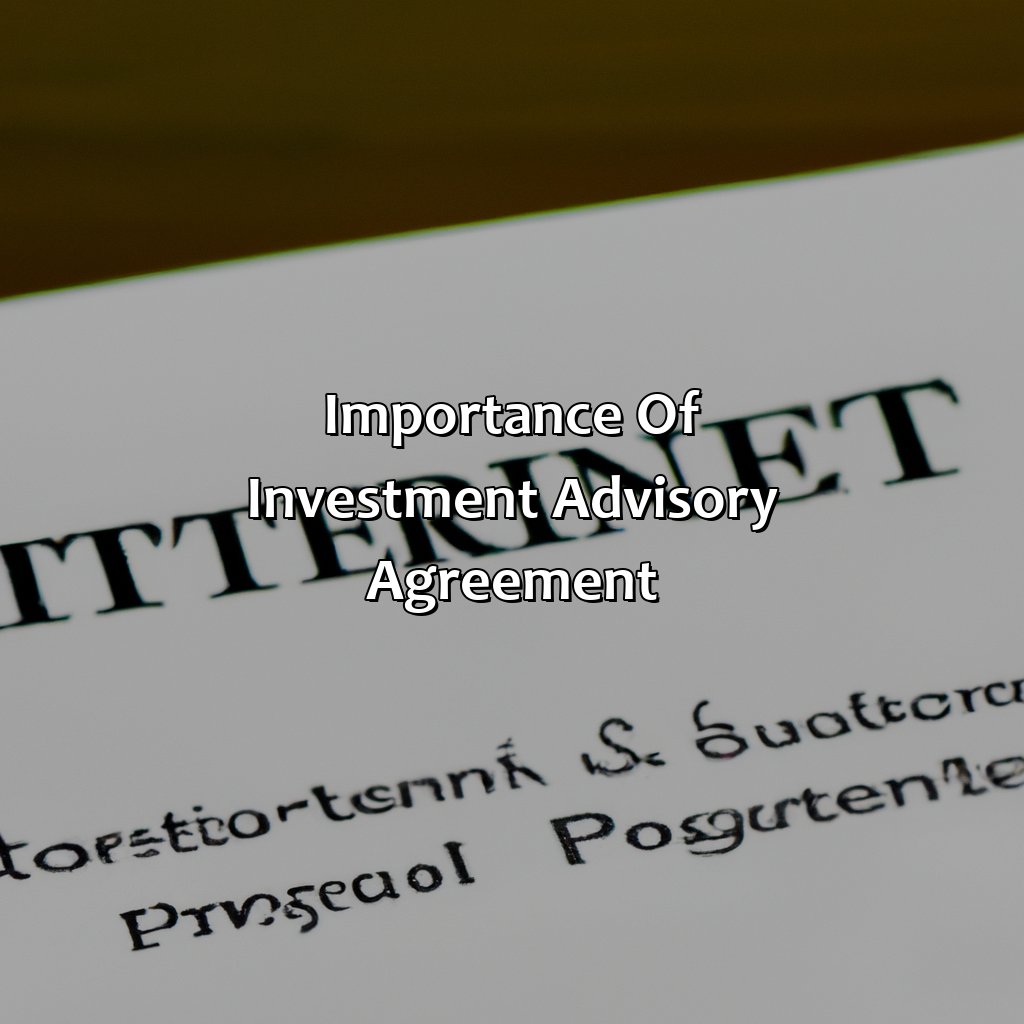What Is An Investment Advisory Agreement?
Key Takeaways on Investment Advisory Agreement:
- An investment advisory agreement is a contract between an investor and an investment advisor, outlining the terms of their relationship and the services provided.
- The agreement typically includes key elements such as the services provided, investment strategies, fees and expenses, and termination and withdrawal terms.
- An investment advisory agreement is important for protecting the investor’s interests, ensuring clear communication and expectations, and ensuring legal compliance.
Unsure of how to manage your investments? Take the confusion out and ensure success with an investment advisory agreement. You deserve to get the most out of your investments – understand how an investment advisory agreement can help you do just that.
What is an Investment Advisory Agreement?
To comprehend an investment advisory agreement, its three components must be understood: definition, purpose, and parties.
What does the agreement mean and include? That’s the definition. Knowing its aim can guide better investments. Lastly, who is involved in the agreement? That knowledge can help you stay legally sound.

Image credits: retiregenz.com by David Duncun
Definition of Investment Advisory Agreement
An Investment Advisory Agreement is a legal document that outlines the terms and conditions under which an investment advisor provides services to their clients. It specifies the responsibilities of both parties, including the types of advice and services offered, fees charged, potential conflicts of interest, and termination provisions. The agreement may also detail any investment restrictions or preferences of the client. This contract serves as a crucial communication tool for ensuring transparency and clarity in the business relationship between an investment advisor and their clients.
It is essential for investors to carefully review this agreement before signing it to ensure they understand the terms and conditions. They should pay close attention to the fee structure to ensure it aligns with their financial goals. Additionally, investors should clarify any ambiguous clauses in the agreement before entering into a business relationship.
Investment advisory agreements must comply with regulatory requirements outlined by governmental authorities such as the SEC and FINRA. Failure to comply can result in civil fines or license suspensions.
A recent study by Statista shows that 66% of Americans have investments.
Signing an Investment Advisory Agreement is like agreeing to let someone else navigate your financial ship, while you sit back and hope they don’t steer you straight into an iceberg.
Purpose of Investment Advisory Agreement
An Investment Advisory Agreement is a formal contract between an investor and a professional advisor outlining the terms of their relationship. It ensures clear communication of investment goals, strategies and the fee structure between both parties. The purpose is to establish expectations, protect both parties’ interests, and provide a framework for effective investment planning.
The agreement highlights how the advisor will offer personalized investment solutions based on the client’s objectives and risk tolerance levels. Additionally, it includes information on fees charged by the advisor for their services, such as management fees, performance-based charges or hourly rates.
Moreover, transparency of relevant information such as investment portfolio reports and risk disclosures are priorities in an advisory relationship. This promotes accountability and ensures that the investor understands where their money is invested.
Pro Tip: Investing in volatile markets can be stressful; ensure you have a knowledgeable Investment Advisor who can create tailor-made portfolios according to your needs, promoting confidence in your investment decisions.
Looks like it takes two to tango in an Investment Advisory Agreement – the advisor and the client.
Parties involved in Investment Advisory Agreement
The investment advisory services involve a written agreement between the parties where the role and responsibilities of each party are defined. Let’s take a closer look at the different parties involved in an investment advisory agreement.
| Parties | Description |
|---|---|
| Investment Advisor | The individual or firm providing investment advice on behalf of the client. |
| Client | The individual or entity receiving investment advice from the investment advisor. |
| Broker-Dealer | A broker-dealer, if involved, works as an intermediary between the client and the advisor. |
It is crucial to understand that each party’s roles and responsibilities are explicitly stated in the agreement before signing.
As per the signed investment advisory agreement, it is essential to follow all terms and conditions. Any breach in this agreement can lead to legal complications.
A well-drafted Investment Advisory Agreement serves as legal protection for both parties, ensuring transparency, trust, and ethical behaviors.
Did you know that Investment Advisory Agreements have been around since 1940 when Congress passed The Investment Advisers Act? The act was introduced to protect investors from fraud by ensuring full disclosure of information about their investment advisors through documents such as Form ADV.
Before signing on the dotted line, make sure your investment advisory agreement doesn’t have more missing elements than a puzzle with half the pieces gone.
Key Elements of Investment Advisory Agreement
To get a grip on the particulars of an investment advisory agreement, you gotta dig deep. Knowing the services, strategies, fees, expenses, termination, and withdrawal terms can help you pick an adviser that fits your investing plan. Get informed before making your choice!

Image credits: retiregenz.com by James Woodhock
Services Provided
As per the Investment Advisory Agreement, the investment advisory firm provides a range of services to its clients. These may include portfolio management, financial planning, investment advice etc.
The Services Provided by the firm can be customized according to the client’s preferences and investment objectives. The investment advisory agreement lays out the scope of services that will be provided to the client, along with details such as fees, duration of contract etc.
It is important for clients to carefully go through this section in order to have a clear understanding of which specific services they will be availing from the investment advisor. Clients must ensure that they do not miss out on any key offerings that may be relevant to their investment goals and objectives.
Thus, thoroughly reading and understanding the ‘Services Provided’ section is crucial for making informed decisions while entering into an Investment Advisory Agreement.
“Why choose one investment strategy when you can have a portfolio of failed attempts?”
Investment Strategies
Investment strategies are the key principles used to manage investment portfolios. These guiding principles help investors make sound decisions that align with their financial goals and risk tolerance levels. The selection of investment vehicles, asset allocation, diversification techniques, and market timing are all essential elements of an effective investment strategy.
An investor’s portfolio should always reflect their short-term and long-term goals. Therefore, an active investment management approach is necessary to see through the fulfillment of these objectives over time. Investment strategies can be categorized as either passive or active.
- Passive investment strategies focus on creating portfolios that mirror specific indices’ performance, i.e., stock benchmark indices like Dow Jones Industrial Average and S&P 500 Indices.
- On the other hand, active investment strategies aim to outperform benchmark indices by using technical analysis, fundamental analysis and other methods to select securities for a specific portfolio.
Pro Tip: An understanding of your risk tolerance level will aid in the selection of a suitable investment strategy for you. Because let’s face it, if you’re paying someone to manage your investments, you should at least know what you’re paying for.
Fees and Expenses
For the section on Monetary Compensation and Disbursement, it is important to understand the various fees and expenses associated with an investment advisory agreement. An investment advisor charges its clients for providing guidance on investments, which can include several types of fees.
Below is a table outlining some common fees charged by investment advisors:
| Fee Type | Definition |
|---|---|
| Management fee | A percentage of the total assets under management that an advisor charges as a fee for their services |
| Performance fee | A fee paid to the advisor if they exceed certain performance targets over a specified period |
| Account setup fee | One time cost charged for creating a new account with an investment advisory service |
| Trading costs | Commissions and other transactional expenses related to buying or selling assets in an investor’s portfolio |
It is crucial to review these fees before entering into an investment advisory contract. Additionally, some advisors may charge administrative fees for printing and mailing monthly statements or other services. Be sure to discuss all possible costs upfront with your advisor.
Investment advisory agreements can also outline trading policies, such as restrictions against trading particular securities or types of investments.
Moreover, it is essential to understand the separation between discretionary and non-discretionary accounts before agreeing. Regardless of what type of account you hold, it’s imperative always closely review all reports sent by your brokerage firm as well.
In fact, according to FINRA’s Investor Complaint Center, disputes relating to misleading or false statements in investment account documentation amounted to 57% of complaints against brokerage firms.
If breaking up is hard to do, terminating an investment advisory agreement is like a messy divorce with your money.
Termination and Withdrawal Terms
The agreement’s clauses that regulate the termination and withdrawal process are of paramount importance to safeguard both parties’ interests. The ‘Terms Relating to Cessation and Withdrawal’ serve to cover different scenarios such as voluntary/forced termination, notice periods, compensation agreements, among others.
It is essential to establish a clear procedure for the cessation of services, including the right to terminate the relationship at any time. This ensures a fair and transparent settlement if either party wishes to withdraw from the agreement. Additionally, a well-elaborated termination clause helps prevent disputes and misunderstandings in case of an untimely departure.
To avoid conflicts, it is advisable to include specific provisions regarding the length of advance notice required before withdrawal or termination. Setting up a reasonable period allows both parties time to prepare accordingly and plan their next steps. For instance, requiring an eight-week prior notification adds certainty and clarity when terminating contractual obligations.
In summary, it is crucial that investment advisory agreements stipulate comprehensive measures for cessation and withdrawal in case either party wants out. Each clause should reflect reasonable expectations and facilitate an orderly exit without harming another party’s interests.
An investment advisory agreement is like a prenup for your money, because you never know when things might go sour.
Importance of Investment Advisory Agreement
Securing your investment with an advisor requires an investment advisory agreement. This agreement shields your interests, encourages clear communication and abides by legal regulations. We will look further into the importance of this agreement, particularly its subsections – Protection of Investor’s Interests, Clear Communication and Expectations, and Legal Compliance.

Image credits: retiregenz.com by James Arnold
Protection of Investor’s Interests
The Investment Advisory Agreement serves as a vital shield for safeguarding an investor’s interests. It offers legal protection, regulates investment-related issues, and ensures complete transparency in the business relationship between both parties.
The agreement clearly outlines the roles and responsibilities of the parties involved, ensuring complete alignment with the investor’s objectives. Furthermore, it highlights potential conflicts of interest and how they will be reasonably addressed. All these provisions work towards providing ultimate protection to the investor.
Another unique facet of this agreement is that it requires advisors to act in their client’s best interest (fiduciary duty). This contractual obligation compels advisors to prioritize their client’s interests above their own when providing advice.
Did you know that according to SEC regulations, investment advisory agreements should always be in writing?
Clear communication is key in any relationship, especially when it comes to your money and investments – unless you enjoy surprises like losing all your savings.
Clear Communication and Expectations
Ensuring crystal clear lines of communication and expectations is necessary while setting up an Investor Advisor Agreement. The agreement clearly outlines the roles and responsibilities of both parties, preventing confusion or misinterpretation. This leads to a better understanding of the scope of work, investment strategies, risk tolerance issues, performance benchmarks and fees structure.
A written Investment Advisory Agreement removes ambiguity between the investor and advisor so that they have a shared understanding about what should be expected from each other. Communication also plays a key role in keeping investors informed; their risk biases, goals, concerns along with the most recent market trends need to be articulated transparently by advisors.
Setting expectations in advance regarding reasons for contact frequency (e.g., quarterly reporting) helps to satisfy clients and enhances retention as well as loyalty.
According to Investopedia.com, “The contents of an investment advisory agreement can vary depending on factors such as the type of client involved or the services provided”.
Skipping legal compliance is like swimming with sharks without a cage – tempting fate and likely to end in disaster.
Legal Compliance
Ensuring adherence to legal requirements is crucial for any investment advisory business. A legally compliant investment advisory agreement protects both the advisor and the client. It lays out the terms and conditions of the relationship, outlines services provided, and identifies potential conflicts of interest.
A well-crafted investment advisory agreement goes beyond outlining essential legal compliance procedures, such as registration forms and acceptable business practices. It also sets out procedures for dispute resolution, termination clauses, and outlines methods of assessing fees.
An investment advisory agreement can demonstrate transparency, establish clear expectations between an advisor and a client, and serves as a reference point in case of disputes. The legal compliance component ensures peace of mind for all stakeholders involved.
Pro Tip: Properly document all interactions with clients. This will help ensure that you have evidence if needed while promoting strong relationships with clients based on your organization’s commitment to providing transparent service delivery.
Remember, if your investment advisor doesn’t have an agreement, it’s not them, it’s you and your poor life choices.
Key Takeaways on Investment Advisory Agreement
When it comes to understanding Investment Advisory Agreement, there are several key points worth considering. Below are some significant takeaways that can help you understand it better:
- An investment advisory agreement is a contract between the investment advisor and the client.
- The agreement outlines the terms and conditions that the advisor must follow while managing investment portfolios on behalf of the client.
- The agreement describes the duration of service and compensation paid to the advisor by the client for their services.
- A written copy of the agreement must be provided to clients before any investment advisory services commence.
- Clients should carefully read all terms specified in the agreement and clarify any doubts before signing it.
- Additions or changes to an existing agreement require written consent from both parties involved.
It’s important to note that while several standardized agreements exist in this field, each contract has unique clauses determined by negotiation between clients and advisors.
Every Investment Advisory Agreement has a legal obligation towards protecting both parties’ interests. In some countries, such contracts also undergo statutory regulation. Clients who sign these agreements must have full knowledge about its content as they are legally bound by them.
A common misconception is that an Investment Advisory Agreement is only meant for affluent individuals or organizations. However, this type of contract can be beneficial to anyone investing their money through an advisor. Even if you feel like you don’t need one, signing one can avoid potential miscommunication or disputes at a later time.
Some Facts About Investment Advisory Agreement:
- ✅ An Investment Advisory Agreement is a contract between an investor and an investment advisor that defines the terms of the advisor’s services. (Source: Investopedia)
- ✅ The agreement typically outlines the advisor’s fees, investment strategies, and the level of discretion they have in managing the investor’s portfolio. (Source: The Balance)
- ✅ Investment Advisory Agreements are regulated by the Securities and Exchange Commission (SEC) and must comply with certain disclosure requirements. (Source: SEC)
- ✅ The agreement should also include provisions for termination, including notice requirements and any penalties for early termination. (Source: Nolo)
- ✅ It is important for investors to carefully review and understand the terms of their Investment Advisory Agreements before signing. (Source: Forbes)
FAQs about What Is An Investment Advisory Agreement?
What is an Investment Advisory Agreement?
An Investment Advisory Agreement is a contract between a client and an investment advisor. The agreement outlines the terms and conditions that govern the client’s relationship with the advisor, including the advisor’s services and fees.
What is the purpose of an Investment Advisory Agreement?
The purpose of an Investment Advisory Agreement is to define the client’s relationship with the advisor. The agreement describes the type of services the advisor will provide and the fees the client will pay for those services. It also outlines the rights and responsibilities of both parties.
What are the key elements of an Investment Advisory Agreement?
The key elements of an Investment Advisory Agreement include the scope of services being offered, the fees being charged, the duration of the agreement, and any termination provisions. The agreement should also include information about the advisor’s qualifications, the methods used to select investments, and any conflicts of interest that may arise.
Is an Investment Advisory Agreement legally binding?
Yes, an Investment Advisory Agreement is a legally binding contract between the client and the advisor. Both parties are obligated to abide by the terms of the agreement as long as it remains in effect.
Why is it important to have an Investment Advisory Agreement?
An Investment Advisory Agreement is important because it establishes clear expectations between the client and the advisor. It helps to minimize misunderstandings and provides a framework for resolving disputes. Additionally, the agreement can help to protect the advisor from any legal liability that may arise from the relationship.
Can an Investment Advisory Agreement be modified?
Yes, an Investment Advisory Agreement can be modified if both the client and the advisor agree to the changes in writing. Any changes to the agreement should be documented and signed by both parties.
